SU Elections 2023: Myer Horowitz Forum Recap
The third forum of the University of Alberta’s Students’ Union 2023 elections was the Myer Horowitz forum.
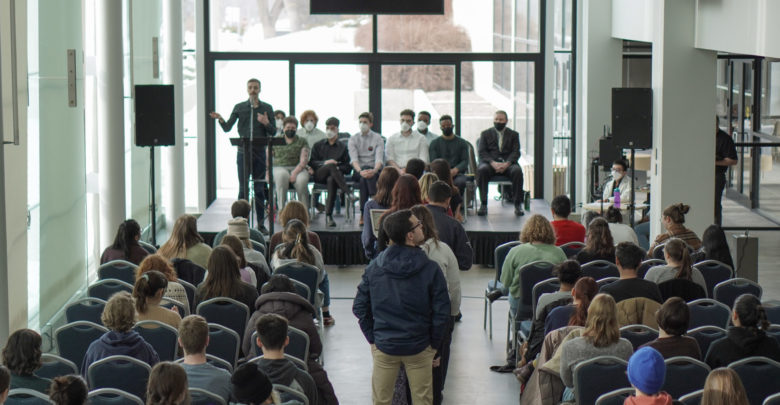 Jonas Smith
Jonas SmithThe Myer Horowitz forum for the University of Alberta’s Students’ Union (UASU) 2023 elections was held in SUB Atrium on March 6. Candidates gave opening statements, and the forum concluded with questions from the audience.
Here is the TL;DR version of this forum:
- President: student representative associations, representation in governance
- Vice-president (operations and finance): accessibility, accountability, and cost-saving measures
- Vice-president (external): affordability and engagement
- Vice-president (academic): marginalized students and new online resources for students and educators
- Vice-president (student life): importance of student life and communicating with students
- Board of Governors Representative: fast-tracking concerns to the Board of Governors
- Alberta Public Interest Research Group (APIRG): funds student-led projects
- Business Students’ Association (BSA): fund supports student-focused areas
- Campus Recreational Enhancement Fund (CREF): provides funding for recreational services
- HUB Community Association (HCA): providing HUB mall residents with services
- Law Students’ Association (LSA): funds events, grants, and services
Presidential candidates discuss student representative associations, women in governance, and leadership styles
During his opening statement, presidential candidate Haruun Ali, a former arts councillor, touched on how as he’s been campaigning, students have been asking him why they should care about elections.
“I’m running to build a vision with you. We will invest in key student services, while shifting our focus back to delivering successful advocacy and student services,” Ali said.
He added that he plans to support student representative associations (SRA), train new student voices, and make student governance a place that supports new and diverse voices.
“Shifting our focus back to being a union will take a lot of hard-work and dedication, but I’m ready to fight with you,” Ali said. “I am ready to do what is necessary to rebuild your trust in your union.”
Current UASU vice-president (external) and presidential candidate Christian Fotang, addressed how the past few years at the U of A have “been made challenging by the increased cost in education,” during his opening statement.
“University should be a place where you hunger for knowledge, not food,” Fotang said. “We must ensure that we are getting the experience for the investment we have put into our education.”
He added that throughout his time as vice-president (external), he has worked to “build coalitions and collaborations, that will hold institutions accountable to their promises.”
During question period, the two candidates were asked what additional supports they plan to provide for SRAs, that are not currently provided by the Students’ Union.
Ali replied that he plans to support SRAs by creating an advocacy office, where SRAs can access support for things such as messaging and research. He added that he wants to provide training for “new student voices.”
“We also want to boost student group grants, and make sure that we’re supporting them, and being the backbone for SRAs, while ensuring that they’re able to do effective advocacy as well,” Ali said.
Fotang said that there is already an advocacy office that SRAs are able to use at the Students’ Union. He added that there’s been useful feedback from student groups about Governance Camp, and that he “would love to assist” with relaunching the Student Representative Association Summit.
Fotang also touched on the student group grant system, and how he plans to review the grant system, and add more grant options.
“Beyond that, I think the biggest thing is also information sharing … so that you can lead and represent your faculty well,” he said.
Rebecca Swityk, who is affiliated with the vice-president (external) race, and is vice-president (internal) of the Organization for Arts Students and Interdisciplinary Studies (OASIS), asked Ali and Fotang how they plan to “cultivate safe spaces for women in higher levels of governance.”
Fotang answered that during his two years of being vice-president (external), women have told him about “how they’re treated, the fact that they’re not empowered to speak up, and the way that they’re treated by councillors has been a problem.”
He added that those comfortable speaking in Students’ Council are mostly male, white, Anglo-Saxon students, and that space needs to be created for women in governance by encouraging them not just to run, but also to speak out once they’re elected.
“As president, all you can do is set the tone, empower and encourage people to speak up while they’re there,” Fotang said. “I hope to be a leader that listens, and encourages other people to listen as well.”
Ali replied that he agrees with Fotang in that “setting the tone for this next council and executive team that we’re here to listen, is crucially important.”
Ali touched on wanting to reinstate the Discover Governance program to support new student voices, and continue supporting the STRIDE program.
“Ensuring that we’re creating a space where people feel safe to share their opinion on council is absolutely important, but also ensuring that we are there to provide support, be the back-bone, and listen.”
Abner Monterio, current UASU president, asked the candidates why they think they’re qualified to lead an executive team with diverse views that may clash. He also asked Ali and Fotang to touch on their leadership philosophy.
Ali replied that if elected, after election results are announced, he plans to discuss platforms with everyone on the executive team, and create a set of executive goals.
“I also recognize that we have to keep our platform commitments. Changing the way our union operates will be a four-year project,” Ali said. “It will be something that we hope to enshrine in the strategic plan to make sure that we’re setting a vision for a union, not a business.”
He added that his leadership philosophy is “learning, listening, and leading.”
“When it comes to leading, taking these voices, taking my own views, and putting them together to create my thoughts on the matter — that’s how I plan to lead the Students’ Union.”
“Leadership is a team sport,” said Fotang. “When you’re trying to bring different perspectives together, there has to be compromise somewhere.”
He added that since all the candidates are male this election, “there’s going to be a lot of views that aren’t going to be represented in the room,” so he plans to ensure that a diversity of students and student groups are talked to.
-Lily Polenchuk
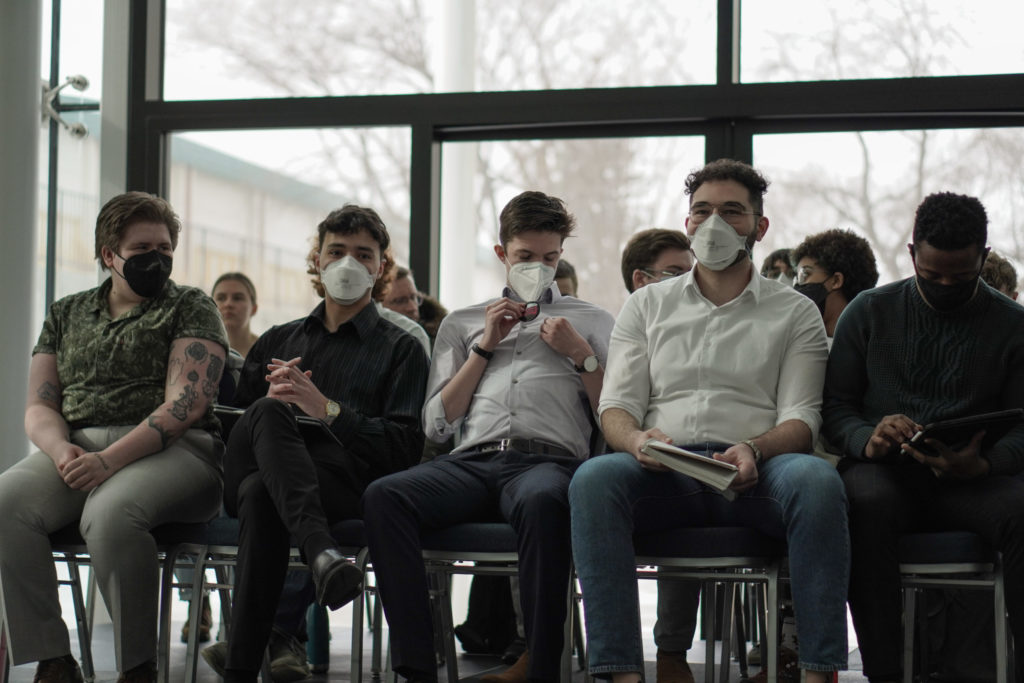
VPX candidate discusses affordability crisis, and engaging students
Chris Beasley, the sole candidate for the vice-president (external) race, touched on the affordability crisis in his opening statement.
“Food and housing are rising in cost — our wages are not rising. This crisis has been exacerbated by the province’s year-over-year tuition increases,” he said.
He added that students are also suffering from a mental health crisis, and investment from the government is needed.
“Our whole generation needs supports and investment from the government. Electing me won’t fix these problems, but you will be electing someone who will fight for you,” he said.
Beasley added that he has experience with advocating from working with the Council of Alberta University Students (CAUS), and serving as president of the Organization of Arts Students and Interdisciplinary Studies (OASIS).
“The person that you want on the other end of that table is someone that has the experience fighting for students, and who shares your values … I will be that voice on the other end of the table.”
During question period, a volunteer from The Gateway asked Beasley how he plans on increasing engagement from the student body to accomplish his goals.
Beasley replied that he thinks there are still ways to engage students, and that there are ways students want to be engaged.
“A lot of times students want to get engaged, and a lot of the time it’s meeting students where they are, whether in classes or in one-on-ones,” he said.
He plans to use his prior experience in student governance to engage students through “grunt work, class talks, and convincing students that they’re needed.”
-Lily Polenchuk
VPA candidates discuss challenges marginalized students face, as well as enacting online resources for students
In their opening remarks, candidate Pedro Almeida said that “in the past week, a lot of promises have been thrown around that, as we can recognize, are either unrealistic or did not address the academic issues important to students.” Almeida then commented on his proposal for more hybrid learning, as well as the proposed syllabus bank.
Candidate Rowan Morris then said that students needed autonomy and flexibility now, as the university was not built for marginalized students.
“From our ableist and discriminatory accommodation processes to xenophobic tuition increases, our university is leaving us behind,” said Morris.
Milan Regmi finished the opening remarks by discussing lack of transparency in the UASU and promised to solve problems proactively.
“I’ll make sure we stop reacting to our problems, and that we take proactive action.”
During question period, an audience member asked Almeida on how he planned to make campus a safer environment for women.
“As we move forward, as we acknowledge all of the issues and the mentality that persists in our culture, it’s important that we address the areas that need to change and improve with time,” he said.
Almeida added that providing support to students will help to make campus safer. “The best way to make campus a safe space for all students, is by having all the accessibility to advising that is necessary,” said Almeida.
The three candidates were then questioned on their approach to advocating for marginalized students, specifically their religious freedoms.
Morris responded that as the academic schedule is based on Anglo-Saxon holidays, “not only should we be hosting celebrations … but we should be recognizing those as days off.”
Regmi then responded, “the Alberta human rights code makes it very clear that we can not force people to work [on] religious holidays.” Regmi continued that this is, “something that needs to be codified by the U of A.”
Almeida responded that, “it’s important that there’s a centralization of accommodation requests that allows for students to maintain and continuously have the same accommodations preserved.” Almeida added that in addition to the maintenance of the request system, regular consultation was important.
A staff member of The Gateway then asked the candidates about how they planned to encourage university staff to participate in their proposed educational reforms, such as modules on how to teach, an increase in online learning, or continuing work on the proposed syllabus bank.
“The syllabus bank is something that’s been long-promised,” Regmi answered. “We’ve had professors that have come to us with legitimate concerns about intellectual property … if we just make it mandatory and force them to put [their syllabi] out there, students could potentially abuse that material.”
Regmi continued that he wanted to make a clear policy that ensures students can’t redistribute educators’ materials without permission. “Making it mandatory … is not going to help without ensuring that professors are comfortable and addressing the legitimate concerns that professors have.”
Currently, certain faculties already require professors to provide their syllabi before the start of the course, said Almeida, so the syllabus bank is just an extension of that.
“I believe it’s very possible for instructors to be required to submit their syllabi,” continued Almeida. “In order to preserve their academic freedom, it would come to having the access to the syllabus bank be through BearTracks … meaning the only students able to access are students at the U of A.”
Morris then answered that many professors, while they’re experts in their chosen field, may not know how to teach.
“What I’m proposing is that, if professors complete the accessibility resources that I’m planning to create … they would then receive a little icon on BearTracks next to their name, just like we have with the Zero Textbook Cost initiative.”
Morris suggested that the use of student power would push professors towards completing this training, as students chose to enroll with professors with the training over those without it.
“I’ve seen the difference between an education professor and a non-education professor and it is stark.”
-Amanda Sparks
VP Ops and Fi discuss accessibility, accountability, and cost-saving measures
In his opening statement, Fateh Arslan talked about how he wants to support the three pillars of sustainability: social, economic, and environmental. If elected, Arslan hopes to make campus more accessible through increasing the amount of ramps on campus, adding braille signage to common areas, and fixing doors.
Regarding economic sustainability, Arslan said, “increasing costs of living is a fact that needs to be addressed and I’m planning to partner up with grocery stores to hopefully get discounts, and student offers back for our students.”
Flaman spoke about how he wants to increase the Students’ Unions accountability, and appropriately fulfill the duties that vice-president (operations and finance) is required to do.
“For years, our accountability and transparency as an organization hasn’t been great, but in recent years, we’ve had operations and finance candidates running on student life platforms, which is how we ended up in a position where both have gotten worse,” he said.
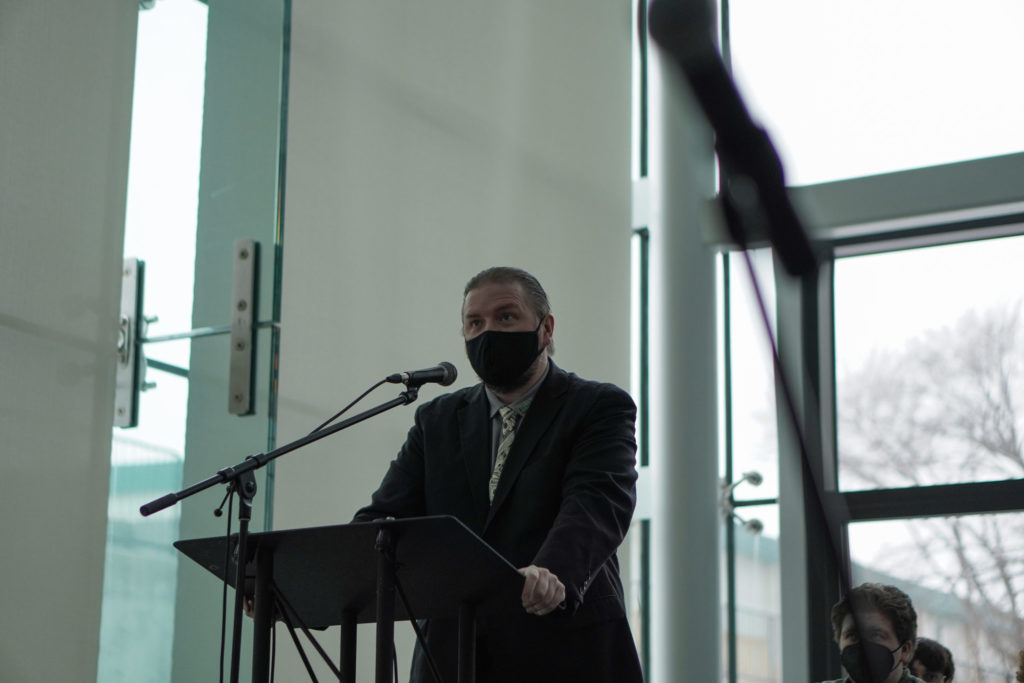
“If you’re distracted with a dozen other initiatives, awareness of the Students’ Union operations and finances is liable to diminish.”
Flaman was questioned about his time as BoG representative, regarding his vote to increase the price of residence and meal plans at Augustana campus by three per cent. He was asked if students could trust him not to reduce student services as a cost-saving measure.
Flaman responded that his fiduciary duty at the time was to the university, whereas if he was elected vice-president (operations and finance), it would be to the student body.
“As a vice-president on the Students’ Union my fiduciary duty would be to the students who elected me to do that. And I wouldn’t be trying to cut funding from services, I’d be trying to cut the money that we pay to our vendors.”
Flaman and Arslan were questioned from a volunteer at The Gateway about how they would balance cost-saving measures and improving accessibility.
“We have businesses and I recognize that those businesses must be run efficiently and smoothly, but at the end of the day, this revenue should go towards the students and towards the betterment of our campus,” Arslan said.
“I’m planning to apply for grants to help improve the ramps and help improve accessibility around the doors around Students’ Union Building.”
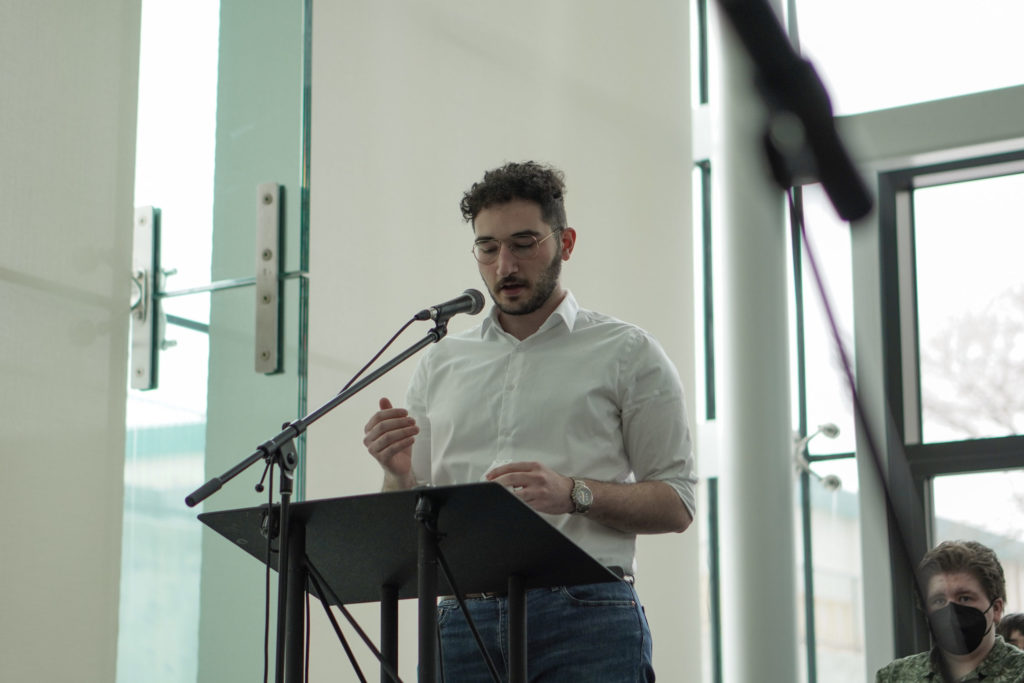
Flaman said that by reducing the Students’ Union’s costs, the Students’ Union can use those additional funds to improve accessibility. Flaman hopes to do this by creating a group purchasing organization with other students’ unions in Alberta.
“If we band together with say, MacEwan and NAIT, it gives us more purchasing power when we approach our vendors and negotiate for better rates on products that we pay for.”
-Dylana Twittey
VPSL candidate discusses communicating with the student body and improving student services
Michael Griffiths, who is running uncontested in the vice-president (student life) race, opened with a statement on the importance of student life at the U of A.
“Student life is at the heart of our campus experience,” he said. “As your vice-president (student life), I would be committed to cultivating a culture where all students feel represented, engaged, and fought for.”
Griffiths emphasized how he plans to improve sexual violence policies, shorten waitlists for “essential services,” and improve the health and safety of campus residence.
In their platform, Griffiths mentions “meeting with student representatives and important stakeholders periodically.” A volunteer for The Gateway asked Griffiths to clarify who these representatives and stakeholders are, and how they intend to communicate with them.
In response, Griffiths stated that if elected, he wishes to consult with resident associations, including those from Résidence Saint-Jean, as well as the International Students’ Association (ISA), and the Indigenous Students Union (ISU) through standing meetings.
“I don’t have the ability to represent these students and I don’t intersect with that identity. So listening to these students and letting them drive what policies I put [forward], and the advocacy I bring for them is going to be really important,” he said.
-Olivia O’Neill
BoG representative hopes to fast-track responses to concerns raised by students
In his opening remarks, Stephen Raitz, the sole candidate in the Board of Governors (BoG) race, explained the role of BoG representative, and mentioned his 15-page platform that includes his understanding of the role.
He said that there should be a focus on issues such as “fighting for accountability regarding exceptional tuition increases in certain faculties,” and issues in academic restructuring.
“To ensure that when issues arise, let’s respond to them and ensure administration reacts and fixes things,” he said.
A volunteer for The Gateway asked Raitz how he would advocate for more diverse representation on the board.
His replied that there are “difficulties with changing the makeup of BoG because it’s set in legislation, which is controlled by the governing party.”
He added that depending on the provincial government, there “could be opportunities to explore changes to BoG’s makeup, and the relationship with the university could change too through a deconsolidation process.”
He described how if elected he would want to raise concerns to the board quickly, especially when specific work comes up from students. He used a volleyball analogy to demonstrate his point.
“Other students are setting things up to the BoG representative, to then spike at BoG,” he said.
Raitz used the example of the sexual and gender-based violence policy from last year, as an example of an issue he would have wanted to fast-track to BoG in order to provide a response “as quickly as possible.”
–Lale Fassone
CREF to support student recreational services
The Campus Recreational Enhancement Fund (CREF) referendum was presented by Lorenzo Grande, the current chair of the CREF. The referendum proposes all students pay $4.70 per semester for recreational services. Augustana students are exempt from this fee.
Grande said students are recruited to “sit on a committee [which] will allocate those funds” to desired services, including those for clubs, sports programs, and intramural programs.
If student recreational groups require funds for equipment or renting facilities, their request will be presented to the student committee.
“Then the funds will be allocated to those groups depending on need and [funding] requirements.”
If the referendum passes, the CREF will continue to fund $290,000 yearly for recreation services for the next five years.
-Aparajita Rahman
APIRG referendum highlights free services and funding for student-led projects
Sarah Alemu, outreach coordinator for the Alberta Public Interest Research Group (APIRG), discussed APIRG’s proposed dedicated fee unit (DFU) of $3.50 per semester for full-time undergraduate students, and $1.75 for undergraduate part-time students.
APIRG is a non-profit organization that funds undergraduate-led projects, “which builds student power for political and social change.”
“We offer many, always free services from printing, and alternative resource library training, to workshops for student groups and free solidarity dinners. We also provide over $50,000 a year in direct-grants for incredible student projects,” Alemu said.
“APIRG is continuing to provide even more free resources, all while reducing our optional student fee by 10 per cent.”
-Lily Polenchuk
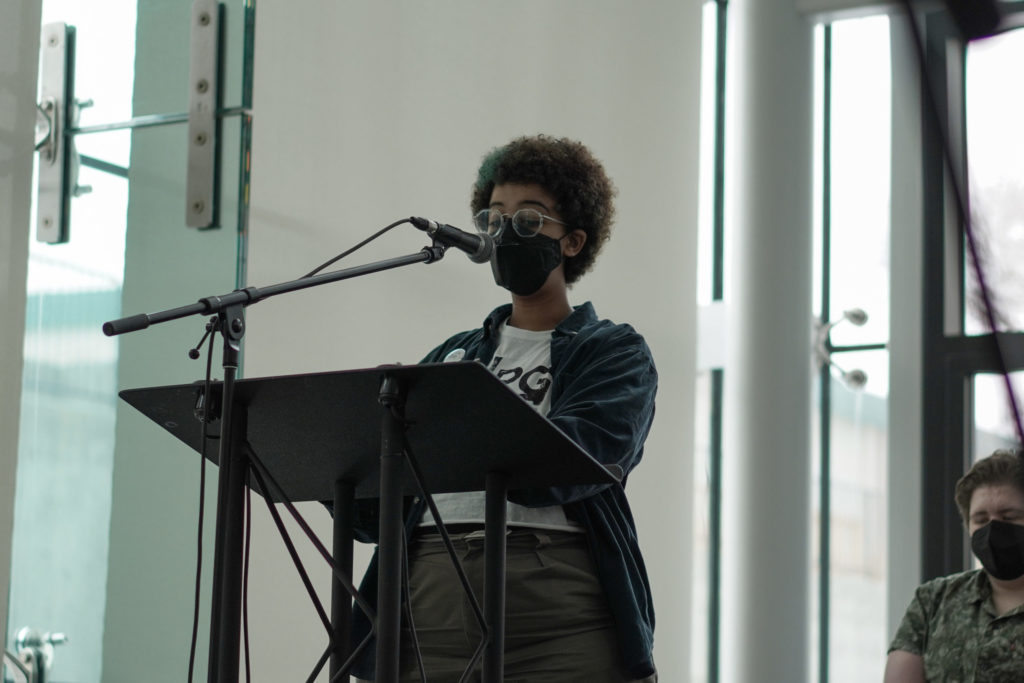
KSRSS referendum will “provide affordable events for students,” former vice-president (finance) says
The Kinesiology, Sport, and Recreation Student Society (KSRSS) referendum was presented by Olivia Harris, former vice-president (finance) of KSRSS. The referendum proposes a FAMF of $3 per fall and winter semester, for kinesiology students.
“We’ve never had a FAMF before, and we’re one of the only student representative associations (SRA) to not have one at this moment,” Harris said.
She added that KSRSS receives funding from the faculty of kinesiology, sport, and recreation, but the fund is needed because of budget cuts that the faculty is experiencing.
“We need this funding in order to continue to provide affordable events for students, mainly our big price-tag events such as our graduation — which was prohibitively expensive last year — and our Kinesiology, Sport, and Recreation camp.”
The fee is refundable, and kinesiology students will have the opportunity to apply for a refund in September.
-Lily Polenchuk
BSA discusses what “student-focused areas” its fee funds
Scott Roberts, president of the Business Students’ Association (BSA), talked about the BSA’s proposed faculty association membership fee (FAMF) of $10 per fall and winter semester, for students enrolled in the faculty of business.
BSA’s FAMF is used for student-focused areas, including student wellness events such as free snacks, therapy dogs, and exam care-packages.
BSA also provides funding to all clubs in the faculty of business, “which helps provide students with more professional development opportunities.”
“We also provide conference funding with this money, where students are able to apply to get funding to go to external conferences outside the U of A, showcasing the hard work of the students at the school of business,” Roberts said.
He added that the fund goes towards “projects of public good,” such as BSA’s period equity program, which provides free period products for students in the Alberta School of Business Building.
-Lily Polenchuk
LSA fee funds programs, grants, and events for students in the faculty of law
The Law Students’ Association (LSA) referendum was presented by Damon Atwood, who is the current first-year representative for LSA. This referendum proposes a four-year FAMF of $50 a year for both full-time and part-time students enrolled in the faculty of law.
“It is a $50 fee that we collect on behalf of the faculty members, to run a variety of programs in our faculty, including grants for all the student clubs,” Atwood said.
He added that LSA provides “a lot of different events; funding, networking, and social engagements to liven up the atmosphere for the students,” with this FAMF.
-Lily Polenchuk
HCA fee provides HUB mall residents with services and events
The HUB Community Association (HCA) referendum was presented by Kelvin Au, the current vice-president (operations and finance) of HCA. This referendum proposes HUB mall residents pay a four-year annual fee of $45.
HCA’s fee provides HUB mall residents with maintenance services, including additional equipment to The Vault common area of HUB mall.
“Unlike many other investment associations, we do run The Vault — one of the only common areas in HUB mall — and post all the equipment there. The FAMF proposal that we have will help go to … support The Vault.”
In addition, the HCA fee will fund social events, including bingo and self-care. All students that live in HUB mall will be paying the fee, but will be provided with the option to opt-out.
-Aparajita Rahman
Every year, The Gateway publishes hundreds of articles like the one you just read that are free for everyone to access. But The Gateway needs your support to continue publishing its award-winning journalism. Please consider donating today, even a small amount can help the University of Alberta’s only newspaper continue serving the campus community. Thank you.




